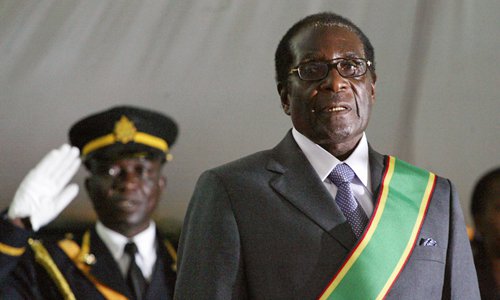HOME >> WORLD
China pays tribute to Mugabe
Source:Agencies Published: 2019/9/6 22:13:40
Former Zimbabwe leader dies at 95

Zimbabwe's former President Robert Mugabe Photo: VCG
China paid tribute to Zimbabwe's ex-president Robert Mugabe, after the former guerrilla leader died on Friday at the age of 95."Mugabe was an outstanding national liberation movement leader and statesman of Zimbabwe," said Chinese Foreign Ministry spokesperson Geng Shuang at a press briefing in Beijing on Friday.
"Throughout his life, he has firmly defended the sovereignty of his country, opposed foreign interference, and actively promoted China-Zimbabwe and China-Africa friendship and cooperation," said Geng.
Mugabe's death was announced by Zimbabwean President Emmerson Mnangagwa.
"It is with the utmost sadness that I announce the passing on of Zimbabwe's founding father and former President, Cde [Comrade] Robert Mugabe," a post on President Emmerson Mnangagwa's official Twitter account said.
Mugabe, who led Zimbabwe to independence in 1980, was one of the most polarizing figures in the history of his continent, a giant of Africa's liberation struggle against colonialism.
The former leader, who ruled the Southern African country for nearly four decades until being ousted in 2017, died in Singapore where he has often received medical treatment in recent years for an undisclosed ailment.
In November, Mnangagwa had said Mugabe was no longer able to walk when he had been admitted to a hospital in the city-state.
Tributes poured in from African leaders.
The South African government sent condolences on the death of a "fearless pan-Africanist liberation fighter."
Kenya's President Uhuru Kenyatta mourned a "man of courage who was never afraid to fight for what he believed in even when it was not popular."
At home, even his foes paid their respects.
"He was a colossus on the Zimbabwean stage and his enduring positive legacy will be his role in ending white minority rule and expanding a quality education to all Zimbabweans," tweeted David Coltart, an opposition senator and rights lawyer.
Mugabe took power in 1980 after seven years of a liberation bush war, with a reputation as "the thinking man's guerrilla."
He held seven degrees, three earned behind bars as a political prisoner of then-Rhodesia's white minority rulers.
Relations between China and Zimbabwe date back to the liberation struggle of the 1960s.
RELATED ARTICLES:
Posted in: AFRICA